JD Dillard‘s Devotion tells the true story of naval aviators Jesse Brown (Jonathan Majors) and Tom Hudner (Glen Powell) as they fought in the Korean War. Brown was the Navy’s first Black aviator, and together with Hudner, both would become the most celebrated wingman in Naval history. Ultimately, Devotion is a film about loyalty and their friendship with each other.
Composer Chanda Dancy worked closely with Dillard to develop the score for Devotion, and she didn’t really deviate from her initial ideas after finishing the first version of the score, as both she and the director knew exactly what they wanted.
Given its numerous aviation sequences, Devotion features plenty of sound effects, and as a result, Dancy had to work around them when it came to writing the score. There are moments in the film, such as its scenes of aerial combat, in which Dancy actually incorporates the Corsair plane dives into the orchestral score.
Below the Line recently spoke to Dancy about her favorite track, how she got her start as a composer, and the importance of community, so read on to find out more about her approach. She also composed the score for another recent Sony release, Whitney Houston: I Wanna Dance With Somebody, which is also now playing in theaters.
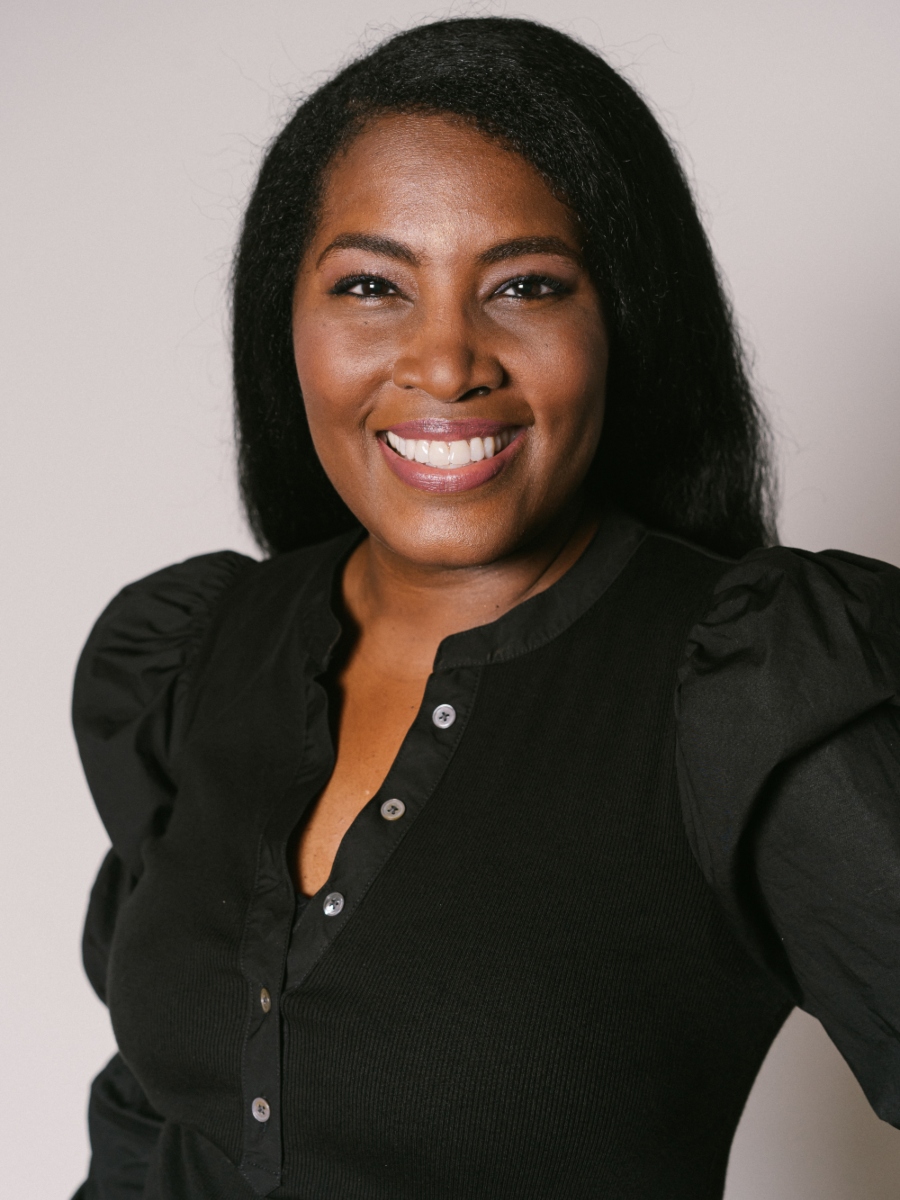
Below the Line: How did you find yourself scoring Devotion?
Chanda Dancy: My agent has worked closely with the producers at Black Label Media on Sicario and some other films. When they were looking for a composer for Devotion, he just put my name in the hat. I was asked to send over a demo of music that I’ve written. I got a meeting with the director — I was sent the script, [so] I read the script first and then met with JD. We totally hit it off and the rest is history.
BTL: Did JD give you any sort of notes or direction in terms of what he was looking for?
Dancy: Oh, totally. It was totally a collaborative effort. From the script, I did start writing some of the main character themes, even before they started shooting. JD would send me some inspirational tracks and things like that. And also, sound effects — plane sound effects, for example. One of those sound effects was the sound of a Corsair plane diving. It makes this really special kind of sound called a dive whistle. I actually use that in one of the cues, one of the battle scenes. I had the orchestra emulate the sound of a Corsair airplane diving. Things like that. JD and I worked very closely to create something special and different.
BTL: Do you typically start working on the score after reading the script, even before you see any footage?
Dancy: It can go either way. I’ve definitely done projects starting at the script stage, and I’ve done projects where the film is completely edited and locked and they’re like, ‘Okay, you have seven days to score it before we send it to the dub stage and put it on TV.’ Obviously, it’s much more fun to start at the script stage than that sort of thing. [laughs]
BTL: I imagine seven days to score an entire film is not the easiest.
Dancy: Yeah.
BTL: I hope it was a short movie!
Dancy: It was only, like, 60 minutes of music, but it was still action-thriller kind of stuff. You just kind of have to write really quickly and [not] second-guess yourself.
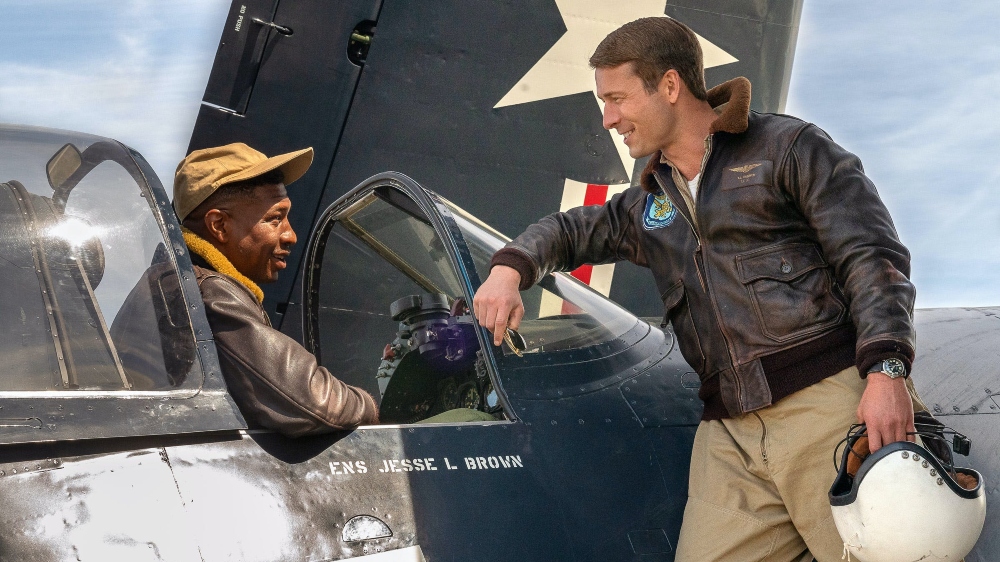
BTL: When it comes to the themes in the film dealing with love, friendship, and loyalty, how did you look to reflect those in the score?
Dancy: That was the heart of the score. One of the very first things that JD and I talked about when we first met was that this film is about love. It’s love for your friends, love for your family, love for your country, devotion to one another, standing up [and] being someone who can be depended upon. How do you create that in [a] score? It’s about tenderness.
Each character has their own theme and the theme goes through its own journey throughout the film. And so essentially, those tender moments in which the theme is treated with velvet gloves, essentially, are those moments where it hits emotionally and gets to that concept of eternal love. That’s the concept. It’s hard to explain in words. It’s so much easier for me to just create the sound waves and then [be] like, “here, listen.” That’s that.
BTL: What were some of the challenges in scoring the aviation sequences?
Dancy: Making sure that I [was] sensitive to the sound effects because there are a lot of plane dives, a lot of really cool explosions and bomb noises, and things like that. You want to give your sound team room. You don’t need to just be blasting music all the way through. You kind of want to duck and weave, following the drama but then leaving. That was the most challenging, even though it wasn’t too bad because the sound team started very early on and there were a lot of sound effects that I was able to work around.
BTL: One of the things I noticed is how the score feels like a classic Hollywood film score while also having a touch of modern-day sounds.
Dancy: Exactly. That was absolutely done on purpose. That was really what JD wanted, for sure. We all love big, old-timey Hollywood scores. We love John Williams, James Horner, and Nicholas Rocha, where you have singable themes, but at the same time, you also have some cool synth work and customized sound effects that are used as music and things like that. Having our foot in both worlds was definitely an on-purpose desire.
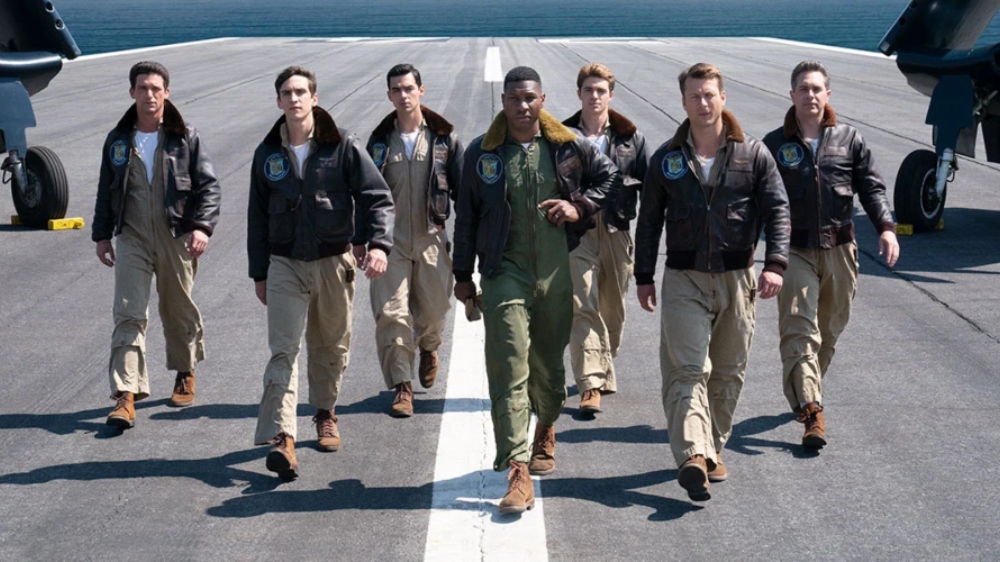
BTL: Do you have a favorite track or theme that you composed for Devotion?
Dancy: Well, I like all of them. I would say [that] the most fun, maybe, is “The Lighthouse.” It’s very joyous and you get the feeling of the joy of flight. I love that, so have a listen.
BTL: Is there a track that evolved the most from the time you started composing?
Dancy: I’m gonna be honest with you. For the most part, this is pretty much version one of the score. I think that the cue that probably changed the most is the battle sequence, sort of, and that’s only [because] when you get more and more sound effects, you tailor even better. Everything was pretty set by version one of the score. Also, being able to work so closely with JD starting at the script stage — we had a lot of time to get to version one and we knew exactly what we wanted at version one, so there wasn’t too much tweaking.
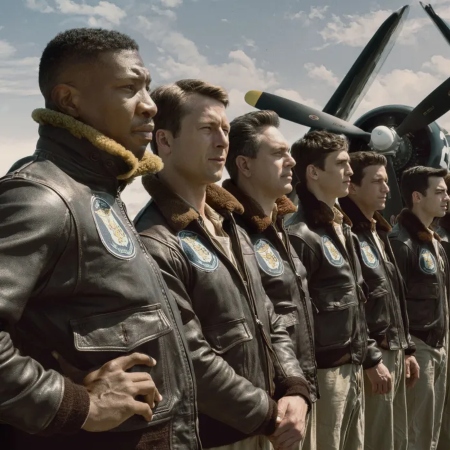
BTL: Were there any challenges in recording the score because of the pandemic?
Dancy: Oh, yeah, for sure. We recorded in Nashville and it was scary because we had to constantly — the musicians had to test, and we had to wear a mask in the control booth and things like that. We were just crossing our fingers that people wouldn’t get sick. We did have an assistant engineer get sick so we had to have another assistant engineer come in and help record. But other than that, we avoided disaster, but it was scary.
BTL: How did you first get an interest in composing?
Dancy: I’ve always been a classical musician. My mother’s mother was a classical musician. She taught me piano when I was really young — I would say, three or four — and then I started violin at eight. By that time, I had been composing little things on [a] keyboard. I didn’t really feel like I got serious about composing until middle school and that’s when I started composing for my middle school orchestra. I just kept going; I never stopped. I don’t think I even thought about another career path. Maybe I wanted to be a doctor at one point, maybe in elementary school. I don’t know. But I think that was just a fleeting thought. It was always music and composing.
BTL: I just spoke with a composer, Kevin Kiner, back in August before I went to Toronto, and he said he was in med school when he decided to quit and just compose music full-time.
Dancy: Actually, my composition professor at undergrad had the same story. She was med. I don’t know if she was pre-med or [if] she was already in med school. But yeah, she decided “nope, composer,” and has been a composer ever since. So yeah, it totally happens more and more often than you think.
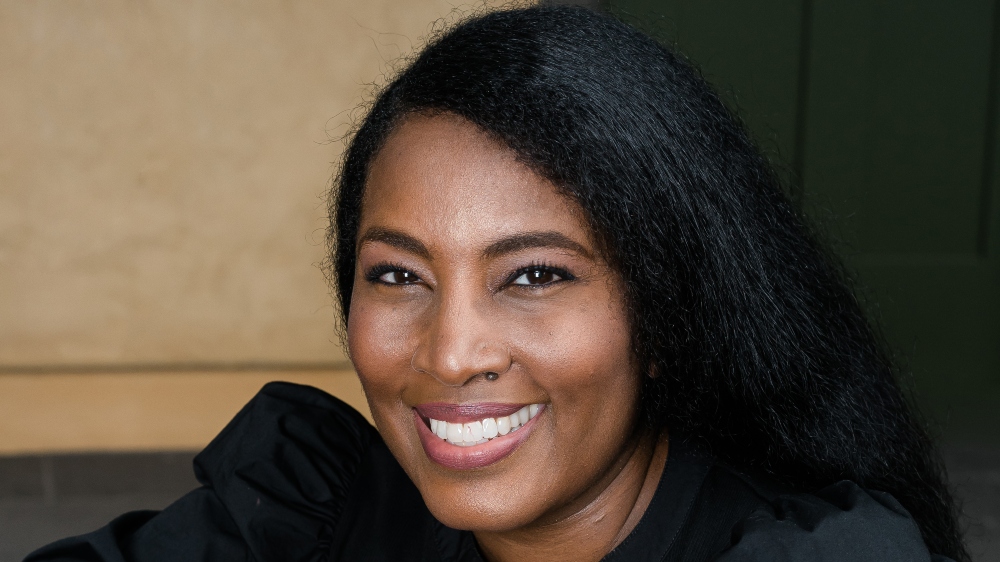
BTL: What has been the most valuable thing that’s stayed with you since attending the Sundance Film Composers Lab in 2009?
Dancy: Collaboration [and] creating your community. The Sundance Composers Lab, the director that I was paired with — Jonathan Wysocki — is still my best friend to this day. I still work on his projects, and also, all of the friends that I made through him. Community, that’s what Sundance [is about], as well as USC and things like that — programs like that, they teach you [that] community is the most important [thing]. Find your tribe, work with your friends, and then work with your friends’ friends, and those friends and their friends. Next thing you know, you have a portfolio of projects that you’re really proud of and working with people [who] you like. I think that’s the most valuable advice I can really give to anyone. What I learned at Sundance — build your community and stick together.
BTL: Have you had the opportunity to watch Devotion with an audience yet?
Dancy: Yes, a couple of times. I feel like our job was done when all the tears and the tissues and things came out. I think we did Jesse Brown and Tom Hudner’s story justice. A lot of heart was put into this film by everyone.
BTL: I was one of the first to see it on the ground in Toronto but I did the P&I because the IMAX screening was a bit out of the way and I was strapped for time.
Dancy: Yeah. I saw it in Toronto, too. [And] yeah, it was a trek to get to the IMAX theater. [laughs] It was like going to an island. It really felt like it was on an island. You’d go across bridges and through woods and stuff.
Devotion is now playing in theaters nationwide, and it will become available for purchase on digital/VOD platforms next week, courtesy of Sony Pictures.





